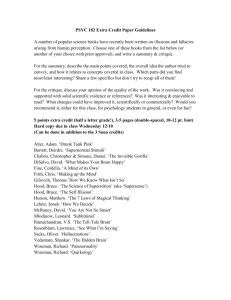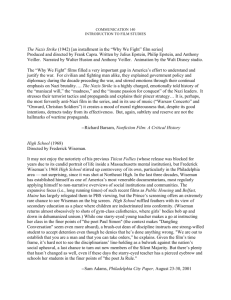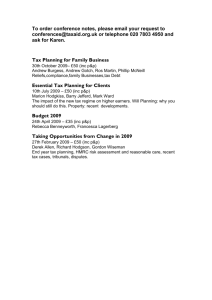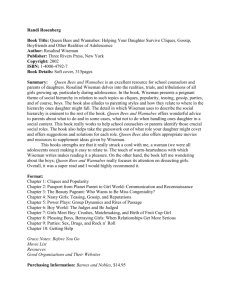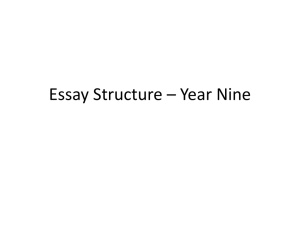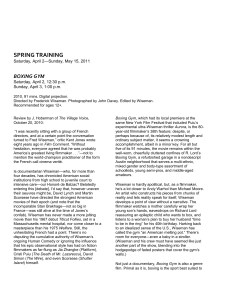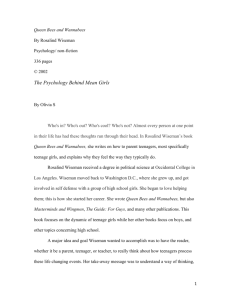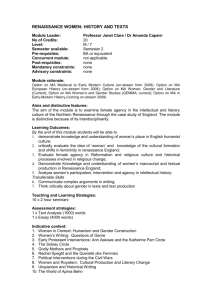June 4, 2013 Robert M. Wiseman Eli Broad Legacy Fellow of
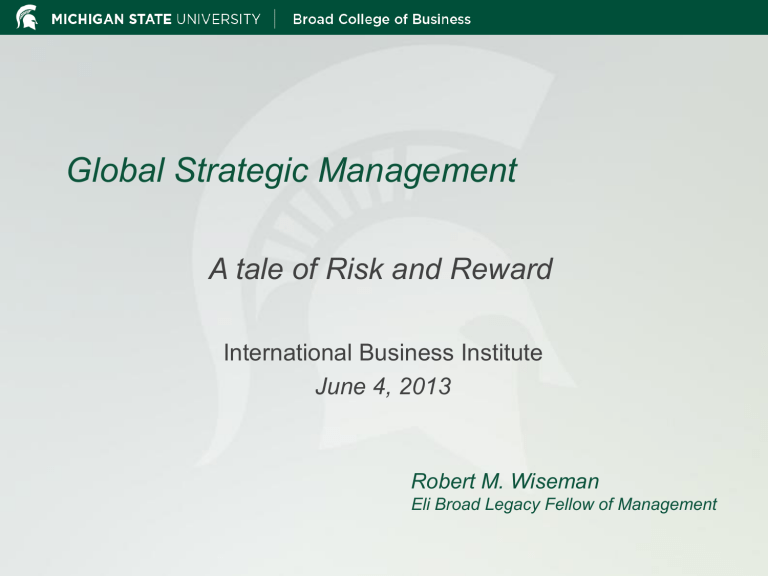
Global Strategic Management
A tale of Risk and Reward
International Business Institute
June 4, 2013
Robert M. Wiseman
Eli Broad Legacy Fellow of Management
Agenda
Nature of Strategy
Why Globalization?
Motivations for foreign entry
Liability of Foreigness
Risks of globalization
Institutional Infrastructure
Opportunity v opportunism
Managing Across Borders
Balancing economic and political imperatives
Robert M. Wiseman 2013 2
Business vs Strategy?
Business: Creating and appropriating value
Strategy: Exploiting market inefficiencies
Robert M. Wiseman 2013 3
Value Chain
Administration and Infrastructure
Human Resource Management
Information Management
Purchasing
Inbound
Logistics
Operations
Outbound
Logistics
Marketing Service
M. Porter, “Competitive Advantage”, 1984
Robert M. Wiseman 2013 4
Recruiting
Training
FIRM INFRASTRUCTURE
Recruiting
Training
Recruiting
Training
System
Design
Component,
Machine Design &
Testing
Info System
Development
Market
Research
Service
Manuals &
Procedures
Computer Media Services
Fabrication
Transpt’n
Supplies &
& Parts Supplies ways that create real economic value”
Inbound Component
Services Travel
-
M. Porter
Handling
Materials, Energy
Assembly
Shipping Advertising
Promotion
Inbound
Fine Tuning
Order
& Testing
Inspection Processing Sales
Force
Maintenance
Parts
Picking &
Delivery
Facilities
Operation
Spare Parts
Subsistence
Service Reps.
Spare
Parts
Systems
Inbound
Logistics
Operations
Outbound
Logistics
Marketing
& Sales
Service
Creating and Appropriating Value
Bargaining
Power of
Buyers &
Quality of
Substitutes
Market
{
Price
Buyer’s Surplus
Seller’s Profits
Bargaining
Power of
{
Suppliers
Robert M. Wiseman 2013 6
Input Costs
Value
Created
Net
Benefit
Influences on Pricing
Supply and Demand
Increasing demand increases prices
Increasing supply decreases prices
$ Hi
Price
Price
Price
Lo
Lo Products sold
Robert M. Wiseman 2013 7
Hi
Influences on Pricing
Willingness-to pay (WTP)
Parker Hannifin Corp.
Cost-plus pricing to WTP pricing in 2002
Net income: $120mm (’02) to $673mm (’06)
ROI: 7% (’02) to 21% (’06)
WSJ, 3/27/2007: A1
Robert M. Wiseman 2013 8
Influences on Pricing
Market Structure
Bargaining power
Importance of substitutes
Intensity of Rivalry
Potential
Entrants
Suppliers
Industry
Rivals
Substitutes
Buyers
Robert M. Wiseman 2013 9
Influences on Pricing
Government Regulations
What transactions are allowed
• Who may transact to buy/sell what product or service
How transactions are implemented
• Degree of transparency in the exchange
Additional burdens on the exchange
• Safety and environmental requirements
Amount of information available about exchange partners
• Information reporting requirements
Robert M. Wiseman 2013 10
Creating and Appropriating Value
Market
Price
Buyer’s Surplus
Value
Created
Net
Benefit
Input Costs
Robert M. Wiseman 2013 11
Forms of Economic Rent
Ricardian Rent
ownership of a valuable assets (land, patents, brand, etc.)
Entrepreneurial (Schumpetarian) Rent
entrepreneurial insight in a complex/uncertain environment (e.g., Microsoft, Amazon, Netflicks)
Monopoly Rent
protection against competition (regulated industry or collusion), generally through control of supply
Quasi-rent (first-best minus second-best use)
the amount a firm may appropriate from idiosyncratic capital or assets
Robert M. Wiseman 2013 12
Strategy in a Global Context
Challenges and Opportunities
A Truly Global Economy
Kia Sorento
Robert M. Wiseman 2013 14
Korea
30,000 parts from Wales,
Mexico, Sweden, China,
Thailand….
A Truly Global Economy
Kia Sorento
Making a Radio/CD player
Robert M. Wiseman 2013 15
One Radio, 5 countries, 5 companies
Four Questions of Global Strategic
Management
Why do firms globalize?
What challenges do global firms face?
What determines success in foreign markets?
How do you manage a multinational business?
Robert M. Wiseman 2013 16
Motivations for Globalization
Scale economies
Growth potential
Lower factor costs
Vertical integration demands
Opportunities
Homogenization of global culture
Competitive dynamics
Defending local markets may require competing globally
Robert M. Wiseman 2013 17
Robert M. Wiseman 2013 18
Global Challenges
The Liability of Foreignness
It’s a Different World
Geographic Context
Transportation, education, and communication
Socio-Cultural Context
Tastes, values and language differences
Industry Contexts
Competitive rivalry, entry barriers, etc. differences
Political Context
Regulatory, economic and political differences
Robert M. Wiseman 2013 19
Formidable Threats
Currency Risk
Foreign exchange rates, inflation
Political Risk
Nationalization of investment, political instability, repatriation of earnings, import/export barriers
Social Risk
Terrorism, social unrest
Transaction Cost Risk
Intellectual property protection, contract enforcement, transparency in exchanges
Robert M. Wiseman 2013 20
Robert M. Wiseman 2013 21
Walmart Enters Germany
Does Small Town
America Sell in Europe?
Wal-Mart Activity System
Local Ctrl over prices “We Sell for Less”
“Everyday Low
Prices”
Low Prices
Minimal Advertising
Low Cost
Store Fixtures
Rural
Store Locations
Greeters”
Customer
Friendly
Return Policy
Convenient
Store Hours
“Product Mix”
Customer Demographic
Robert M. Wiseman 2013 22
Low cost store leases
Strict Cost
Control
Low in-Store
Licensing Fees
Hard bargaining w/ vendors
Efficiency from
Technology
Efficient
Operations
Efficient use of
Floor Space
Culture Emphasis:
Efficiency
High T/O
Merchandise
Hub & Spoke
Distr. System
Inventory Mgmt
Few Stock outs
Non-union
Employees
Inbound Logistics:
Back Haul
Low Pay scale
Incentive based
Associate
Satisfaction
Frequent
Communication
The
“Wal-Mart Cheer”
Wal-mart: Wir Übergaben!
Business Week, April 18, 2005
Robert M. Wiseman 2013 26
The Chinese Price Advantage
Jeep 2500 (Chrysler Group)
Price: $13,200
3 Domestic Competitors
Average Price: $10,000
158 unit sales
First 2 months of 2005
5,304 unit sales
Combined, First 2 months of 2005
“From Fat Profits to Hardscrabble?” The Outlook for China Car Market 2005-2010, Automotive News China Conference, 20 April 2005 Michael J. Dunne
Robert M. Wiseman 2013 27
What Type of Advantages Transfer
Downstream advantages are less transferrable
Cost structure, product design, or product features
Midstream are moderately transferrable
Patents, processes, technology, and other assets
Upstream advantages are most transferrable
An ability to adapt and learn
Robert M. Wiseman 2013 28
Institutional Infrastructure
Transaction Costs Rise
Robert M. Wiseman 2013 29
Markets Fail When Exchanges Don’t Occur
Dilbert, May 10, 2009
Robert M. Wiseman 2013 30
Market Failures: Institutional voids
Market failure occurs when mutually beneficial transactions do not occur because the cost of performing the transaction is too high.
Transactions costs arise from uncertainty about potential transaction partners, the cost of writing and enforcing contracts.
Robert M. Wiseman 2013 31
Transaction Costs: information asymmetry
Those who are information disadvantaged may be reluctant to transact
the market for “lemons” leads to lower prices offered
Lower market prices leads to the removal of higher valued goods from the market.
Costly to overcome information asymmetry
If costs are privately born they may exceed value of transaction
Robert M. Wiseman 2013 32
Transaction Costs: Contracting costs
Long-term relationships in dynamic settings.
A 5-yr contract to build an aluminum smelter in
Botswana.
Relationship-specific investments, including all upfront costs to service the partner.
Creates a potential for “hold-up.”
Building a railroad spur to an auto plant.
Unclear property rights.
especially true for intangible assets like knowledge, ideas, innovations.
Who owns the rights to an idea for a movie?
Robert M. Wiseman 2013 33
Transaction Costs: Lack of public goods
Absence of impartial courts
Absence of laws protecting property rights
Absence of political will or ability to enforce laws
Absence of reliable economic facts!
Hernando de Soto (Bloomberg Businessweek, 4/28/2011)
• The Mystery of Capital: Why capitalism triumphs in the west and fails everywhere else
Douglass North (Institutions, Institutional Change & Economic
Performance, 1990)
Robert M. Wiseman 2013 34
IP Protection in China?
Overcoming Market Failure
Bring transactions into the firm (i.e., hierarchical control)
Prevents transaction parties from walking away
Reduces “property rights” problem
Provides enforcement mechanism
Reduces information asymmetry
Robert M. Wiseman 2013 36
Overcoming Market Failure
Clustering of firms in geographic regions
Frequent intra-group trading increases information
• Finding a key resource is more likely (e.g., talent)
Tight communities discourage deviant behavior among rivals
• Informal networks develop to share information
Lower risks of hold-up, hence more up-front investment
• Locate where there are many players
Robert M. Wiseman 2013 37
Overcoming Market Failure: Business Group
Family ties reduces information asymmetry, increases trust
Creates an internal private capital market
Interlocking ownership provides enforcement mechanism
Robert M. Wiseman 2013 38
Tata Group Holdings, 1997
Company
Tisco
Tata Sons’
Stake
8.5%
Total
Holdings*
15.0%
Telco
Tata Power
Tata Chemicals
Tata Tea
Indian Hotels
ACC
2.9%
6.4%
8.2%
8.6%
14.5%
11.2%
15.2%
20.0%
29.6%
29.0%
37.0%
12.0%
*Includes all cross-holdings
Robert M. Wiseman 2013 39
Tata Board Interlocks Among Directors
Company
Tata Sons
TIL
Telco
ACC
Chairman Board Size Dir. Overlap
Ratan Tata 16 13
Ratan Tata
Ratan Tata
16
11
12
5
Tisco Ratan Tata
Tata Chem.
Ratan Tata
Tata Tea Ratan Tata
Tata Power Ratan Tata
Indian Hotels A. Kerkar
N. Palkhivala
11
10
8
6
11
11
4
3
1
1
6
4
Robert M. Wiseman 2013 40
Nature of Business Groups
Business groups are not a legal entities
Loose alliance of companies
Each individual company is legally independent
Several companies are likely to be publicly traded
Group members hold ownership in each other
Robert M. Wiseman 2013 41
Development of Intermediation
As public sources of intermediation develop, the need for business groups declines.
Active and reliable markets for labor, capital, technology, human resources etc.
Government enforcement of contracts & property rights
Independent sources of information about transaction partners
Hence, the value added from being in a business group declines
Robert M. Wiseman 2013 42
Robert M. Wiseman 2013 43
Managing Multinational
Balancing Economics and Socio-Politics
Economic Demands to be Competitive
Improve efficiency by streamlining operations
Achieve economies of scale
Coordinate R&D efforts
Share assets and knowledge as much as possible
Transfer people and knowledge
Robert M. Wiseman 2013 44
Socio-Political Demands to be Responsive
Be responsible to local government demands
jobs and taxes
Adjust to different regulatory setting
restrictions on competitive practices
Recognize cultural differences
product design and placement
human resource practices
Robert M. Wiseman 2013 45
Balancing Demands with a Transnational
Strategy
Balances cost with differentiation benefits
Balance global efficiency and competitiveness with national-level responsiveness and flexibility
Cross market capacity to leverage learning
Team Organization Structure
• business manager
• country manager
• functional manager
• corporate manager
Robert M. Wiseman 2013 46
Summary
Strategic management seeks to generate economic rents by exploiting market imperfections
Controlling supply, owning valuable resources or creating market disruptions
Foreign markets offer opportunities to leverage existing resources and forestall competitive threats
Growth opportunities, leverage capabilities, forestall competitive threats
Transferring advantages across national boundaries is risky and costly
Robert M. Wiseman 2013 47
Summary
Foreign markets present unique risks
Liability of foreignness, lack of critical infrastructure, and threat of opportunism
Political risks including investment and foreign exchange risks
Managing a multinational firm requires balancing economic and political imperatives
Global efficiency versus satisfying unique local demands
Managing the tension between corporate headquarters and local subsidiaries
Robert M. Wiseman 2013 48
Global Strategic Management
“I don’t think we’re in Kansas anymore, Toto.”
--Dorothy, Wizard of Oz
Robert M. Wiseman 2013 49
